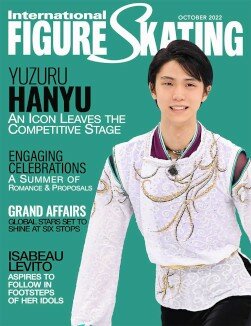Cortina, Italy, 1956.
When Hayes Alan Jenkins stood atop the podium to receive his Olympic gold medal in Cortina, his younger brother, David, winner of the bronze medal, was standing beside him. “I will never forget that day,” Jenkins said in reflection. “Standing on the podium together was a very unique and special moment for us. Watching your flag rise makes you feel so much pride in what you have accomplished.
In Cortina, the competition was held on artificial ice. “If it was a sunny day without any wind it was great,” Jenkins recalled. “If it was a windy day you had to learn to adjust the pattern of your program so that you were never jumping directly into the wind and carried too far down the ice. It was something skaters of my day instinctively adjusted to. I much preferred to compete indoors so I did not have to put up with the ice variances.
“It was during those Olympics that Carol (Heiss) and I first started spending time together. I would not say we were dating — we were just enjoying each other’s company. It was a wonderful time in my life.” (The couple recently celebrated their 61st wedding anniversary).
Dick Button always referred to Jenkins as the “master of the flying sit spin.” Jenkins finds irony in that title. “It is funny — each skater seems to have a particular jump or move that seems to be theirs and I was always known for the flying sit spin,” he said. “I never really had to work hard to master it.”
Jenkins made his first World team at age 15, and remained on the national squad for eight years. He won bronze medals in 1950 and 1952 and claimed three World crowns from 1953 to 1956. “Having placed fourth at the 1952 Olympics and third at Worlds, I decided to skate one more year because the (World) title was vacant (Dick Button had retired) and I wanted to become the World champion,” Jenkins said.
“I moved to Colorado Springs to train at the Broadmoor and I won my first World title in 1953. Then I said to myself: ‘I don’t want to be a one-time champion’ so I went back to defend my title in 1954. The Olympics were less than two years away and I wanted very much to be the Olympic champion. As meaningful as the World title is there is something extra special about winning an Olympic gold medal.
“Then, David and Carol were World champions from 1957 to 1959 and both became Olympic champions in 1960,” Jenkins recalled. “The three of us have very special memories.”
Jenkins skated professionally with Holiday on Ice for a couple of years, attended Harvard Law School and practiced international law until he retired.
RELATED: SKATING PIONEERS






